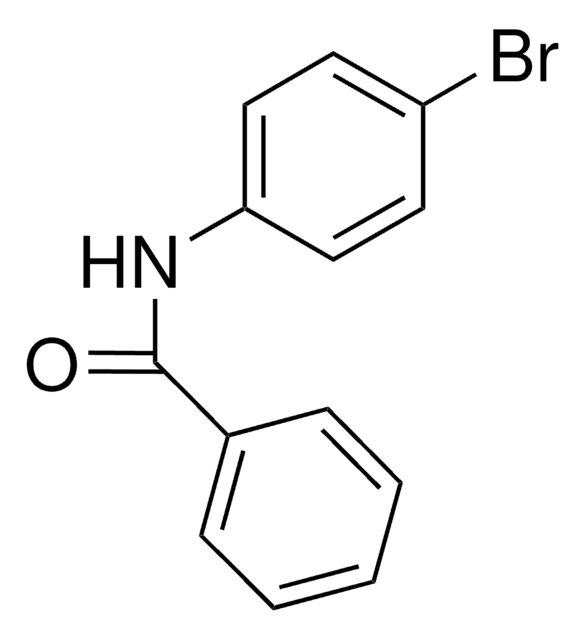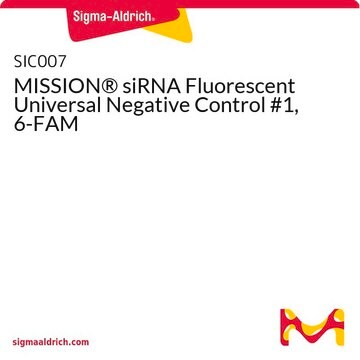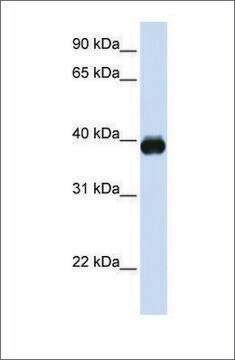NCLMIR001
MISSION® Lenti microRNA, Human
Negative Control 1
Zaloguj sięWyświetlanie cen organizacyjnych i kontraktowych
About This Item
Kod UNSPSC:
41106609
NACRES:
NA.51
Polecane produkty
Poziom jakości
linia produktu
MISSION®
Postać
liquid
stężenie
≥1x106 VP/ml (via p24 assay)
Warunki transportu
dry ice
temp. przechowywania
−70°C
Opis ogólny
Sigma′s Mission Lenti-miRs express miRNAs from a common backbone, whose structure meets requirements for accurate Dicer processing and a partially complementary strand is designed to mimic the base pairing pattern in the backbone structure using a proprietary algorithm. Oligos containing the microRNA sequences are cloned into the TRC2-pLKO-puro vector. Each miRNA construct has been cloned and sequence verified. Mature microRNA sequences are obtained from miRBase.
Lentiviral transduction particles are produced from sequence-verified lentiviral plasmid vectors. Oligos containing the microRNA sequences are cloned into the TRC2-pLKO-puro vector. Co-transfection of this vector into the appropriate cell line with compatible packaging plasmids produces viral particles that can be used to transduce mammalian cells. The polymerase II promoter, elongation factor 1 alpha (EF1A), was chosen to drive miRNA expression needed for reverse transcription of viral RNA and integration of viral DNA into the host cell genome. Additionally, the Woodchuck Hepatitis Post-Transcriptional Regulatory element allowing for enhanced expression of transgenes delivered by lentiviral vectors. This lentiviral vector also carries a puromycin resistance gene for selection of cells. Unlike murine-based MMLV or MSCV retroviral systems, lentiviral-based particles permit efficient infection and integration of the specific miRNA construct into differentiated and non-dividing cells, such as neurons and dendritic cells.
Lentiviral transduction particles are produced from sequence-verified lentiviral plasmid vectors. Oligos containing the microRNA sequences are cloned into the TRC2-pLKO-puro vector. Co-transfection of this vector into the appropriate cell line with compatible packaging plasmids produces viral particles that can be used to transduce mammalian cells. The polymerase II promoter, elongation factor 1 alpha (EF1A), was chosen to drive miRNA expression needed for reverse transcription of viral RNA and integration of viral DNA into the host cell genome. Additionally, the Woodchuck Hepatitis Post-Transcriptional Regulatory element allowing for enhanced expression of transgenes delivered by lentiviral vectors. This lentiviral vector also carries a puromycin resistance gene for selection of cells. Unlike murine-based MMLV or MSCV retroviral systems, lentiviral-based particles permit efficient infection and integration of the specific miRNA construct into differentiated and non-dividing cells, such as neurons and dendritic cells.
Polecane produkty
Two negative controls are available: NCLMIR001 and NCLMIR002
Informacje prawne
MISSION is a registered trademark of Merck KGaA, Darmstadt, Germany
This page may contain text that has been machine translated.
Kod klasy składowania
12 - Non Combustible Liquids
Klasa zagrożenia wodnego (WGK)
WGK 3
Temperatura zapłonu (°F)
Not applicable
Temperatura zapłonu (°C)
Not applicable
Certyfikaty analizy (CoA)
Poszukaj Certyfikaty analizy (CoA), wpisując numer partii/serii produktów. Numery serii i partii można znaleźć na etykiecie produktu po słowach „seria” lub „partia”.
Masz już ten produkt?
Dokumenty związane z niedawno zakupionymi produktami zostały zamieszczone w Bibliotece dokumentów.
Lei Zhang et al.
Biomedicine & pharmacotherapy = Biomedecine & pharmacotherapie, 107, 424-432 (2018-08-14)
MicroRNAs (miRNAs) regulate a variety of development and physiologic processes, and play prominent roles in the initiation and progression of human cancers including hepatocellular carcinoma (HCC). MiR-23c is recently emerging as a cancer-associated miRNA, while its expression status and functional
Liang Bao et al.
Journal of biosciences, 42(4), 671-681 (2017-12-13)
Lung cancer is the leading cause of cancer-related death throughout the world. We aimed to investigate the role of a novel microRNA-876-5p and its potential molecular target bone morphogenetic protein 4 (BMP-4), in the epithelial-mesenchymal transition (EMT) of lung cancer.
Nasz zespół naukowców ma doświadczenie we wszystkich obszarach badań, w tym w naukach przyrodniczych, materiałoznawstwie, syntezie chemicznej, chromatografii, analityce i wielu innych dziedzinach.
Skontaktuj się z zespołem ds. pomocy technicznej








